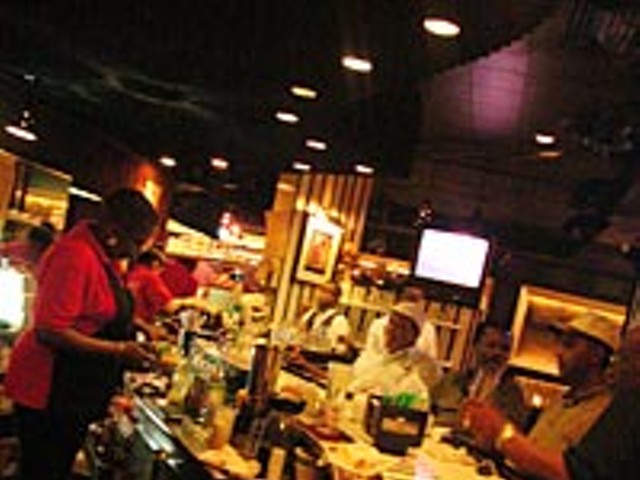Mike Dykehouse takes flight. Leaving his body tucked in a booth at Ann Arbor’s Red Hawk Grill, he’s off rummaging through his personal history to recall a childhood scene in Kalamazoo that segues into how “machine fetishes” and “cartoon sex” play a part in his work, shining a critical light on his life and music, which he calls “strange” and “uncommunicative.”
In a couple of heartbeats, he’s back, apologizing for his absence, apologizing for his apologies. But there’s no need. Mike Dykehouse’s natural graciousness is charming. An opportunity to take a chatty trip in his company is simply too good to pass up.
But during that trip, all bets are off. The conversation is not always comfortable; it’s at once confounding and intriguing, and though it takes many quick twists and turns, it’s OK to just go with it.
Experiencing Mike Dykehouse face to face is often more abstract than experiencing Dykehouse the recording artist, whose widely anticipated Midrange LP is scheduled to be released May 4, on Ghostly International.
The album contains 10 seemingly conventional songs — six boy-girl vignettes marked by longing and loss and four ambient electronic pieces — all linked with an aching humanism that Dykehouse dismisses as “pure cheese-ball banality.”
One scan of the pop dial will prove that people like cheese-ball banality, and the pop-sensible song craft that populates Midrange seems ready-made for mass consumption, which, in his hands, is not a bad thing.
But Dykehouse isn’t so sure. In his typically self-deprecating way, he says, “Techno kids will think it’s bullshit. Garage kids will think it’s bullshit. I’m not convinced it’s not a piece of shit myself.”
Apparently, critic Dave Segal agrees.
Writing in the April issue of XLR8R, Segal claims “a gooey sentimentality clogs” many of the songs on Midrange, and that Dykehouse’s “1984-style melodramatic stadium alt-rock and silky smooth interpretations of My Bloody Valentine’s tone-bending guitar wizardry seem more like fanboy pandering than inspired homage.”
Harsh.
But Dykehouse knew that was coming, especially after he made an off-handed claim that Midrange is the follow-up to My Bloody Valentine’s masterwork, Loveless. That band’s 1991 chef d’oeuvre is still held up as a blurry guitar-pop benchmark. The ballsy comment was published in a recent issue of Urb that saw Dykehouse included in the magazine’s list of 100 artists on the rise. He’s an artist on the rise to be sure, but the follow-up to Loveless?
“I shouldn’t have said that, and I didn’t mean it the way it appeared,” he says of the Urb quote. “They’ll all come after me for that … and I deserve the criticism.”
Actually, Dykehouse and his critics are equally misinformed. Midrange bears slight resemblance to anything in the MBV catalogue.
And “fanboy pandering” is a little off-the-mark. Dykehouse arrived late to MBV, when he was an art student at the University of Michigan in the early ’90s. By then, he had already acknowledged “music as my salvation,” and spent periods identifying with the Smiths (“it was the songs about isolation and small-town longing,” he says) and J. Mascis and his band, Dinosaur Jr. A careful listen to Midrange reveals hints of each.
“Dinosaur married post-hardcore energy with emotion and sensitivity,” Dykehouse says, singling out the band’s 1987 LP You’re Living All Over Me as “essential.”
He doesn’t deny that My Bloody Valentine’s music had an influence on his own work, but it wasn’t a singular influence.
But when Dykehouse started writing and producing his own music in the mid-’90s, it was much more abstract than the left-field pop that had first inspired him. Dropping out of art school, he piecemealed together a recording studio with a sampler, a drum machine, a four-track recorder and a “crappy” synthesizer, and began making what he describes as “schizophrenic IDM” (Intelligent Dance Music). He was following the lead of outsider electronic artists like Aphex Twin and Luke Vibert.
One of Dykehouse’s early champions was Mike Paradinas, aka u-Ziq, who records music and runs Planet Mu out of his home in Worcester, England. Paradinas released the first Dykehouse instrumental full-length, 2001’s Dynamic Obsolescence, and included a short Dykehouse vocal piece (“On/Off”) on his own Bilious Paths LP a year later. Dykehouse went to England to record the sessions.
“Mike is a true gentleman,” Paradinas said via e-mail. “So polite ... maybe over polite sometimes, so much so that we had a few beers to loosen him up to get him in the mood for his vocal performance. Perhaps he loosened up a little too much, because when a drop of alcohol enters his bloodstream he becomes an absolute monster, rude, repulsive and violent — no, that was a joke!”
Around the time he recorded “On/Off,” Dykehouse began listening to retro-guitar-pop in earnest. He reduced his bedroom studio to a guitar, a mini-disc microphone and an Apple computer loaded with recording software. He started hosting a wack karaoke night at Ann Arbor’s Blind Pig, where the shy, reclusive boy began to evolve into a confident, chain-smoking crooner with attitude; Clark Kent was donning Superman’s garb.
That’s when a demo of Dykehouse’s new stuff landed in the lap of Ghostly International boss Sam Valenti. It overwhelmed Valenti, who says he found it “really stunning. I honestly listened to it a hundred times.”
The way Valenti tells it, Dykehouse had already achieved legendary status in Ann Arbor because of Dykehouse’s affiliation with Planet Mu, “confrontational and absurdist” karaoke style and a bizarro performance on the Underground Stage at the first DEMF in 2000.
“I remember meeting Mike distinctly,” Valenti says. “He was a big guy with long hair and big, white headphones from the ’70s. A really strong presence. ... For Mike, it isn’t ‘let me display my talent,’ it’s more about going to war with himself and the audience. There’s an energy of discomfort, but also a true love of his own music.”
Dykehouse seems to agree. “I create a state of confusion in public,” he says. “Partly because of nervous energy and partly because I want to leave blood on the floor.”
Ghostly’s 2003 compilation, Idol Tryouts, included Dykehouse’s rendition of a My Bloody Valentine cover of Wire’s “Map Ref. 41º N 93º W.” This vertiginous exercise in trompe l’oeil — a mind-fuck methodology that questions the nature of authenticity and originality — thrilled the art historian in Valenti. Amid the comp’s trailblazing techno, electro-pop, experimental hip hop and ambient selections by Dabrye, Midwest Product, Matthew Dear, Kiln and others, Dykehouse’s hard-charging synth-rocker stood out.
In solitude, gaining momentum (and an elite fan base) solely on his own merit, Dykehouse has become a true anti-star. And Midrange surfaces as the logical result of Dykehouse’s recent history.
He’s created a beautiful pop record that’s flooded with color, saturated with piles of effects, inundated with layer upon layer of voice and synthetic instrumentation and near epic production. It sounds like a raging guitar orchestra behind a chorus of 15 or 20 baritone voices, Dykehouse says “about 90 percent” of Midrange is made up of digital programming.
It’s a producer’s record, not a songwriter’s, a point that Dykehouse willingly concedes.
“The lyrics were an afterthought, and subpar to say the least,” he says, again spiraling into self-effacement. “I’m still looking for my voice as a songwriter. I want to make music that’s more accessible and more radical at the same time. And better than what I’ve already done.”
So where do the “machine fetishes” and “cartoon sex” fit in?
Dykehouse explains by saying he is a fan of J.G. Ballard, whose novel, Crash — a heady tale of sex, car wrecks and the pornographic nature of violence — was infamously made into a film by another one of his artist-heroes, David Cronenberg. OK, “machine fetish” explained. And “cartoon sex”?
“It’s just there in all my songs,” he says. He cites the nu-new wave, pop scorcher, “Chain Smoking” — the LP’s first single — which he describes as “wimpy, emotive rock; a portrait of a weak male in a syrupy, unhealthy relationship.” And “When You Come,” a pitched-down psych-ballad about “cheesy sex with clichéd references, put into a carnival setting.”
And just like that, Dykehouse packs up his rambling carnival and leaves; apparently he really has somewhere to go. He apologizes for the abruptness and hits the door. A fine mist falls around him as walks out onto State Street. He has an umbrella under his arm but he doesn’t use it. He reaches for his big white headphones instead, and wraps them around his neck. Dykehouse is last seen floating up the street, destination unknown.
Dykehouse will celebrate the release of Midrange with a performance on Friday, April 30, at the Magic Stick (4120 Woodward Ave., Detroit.
E-mail Walter Wasacz at [email protected].




